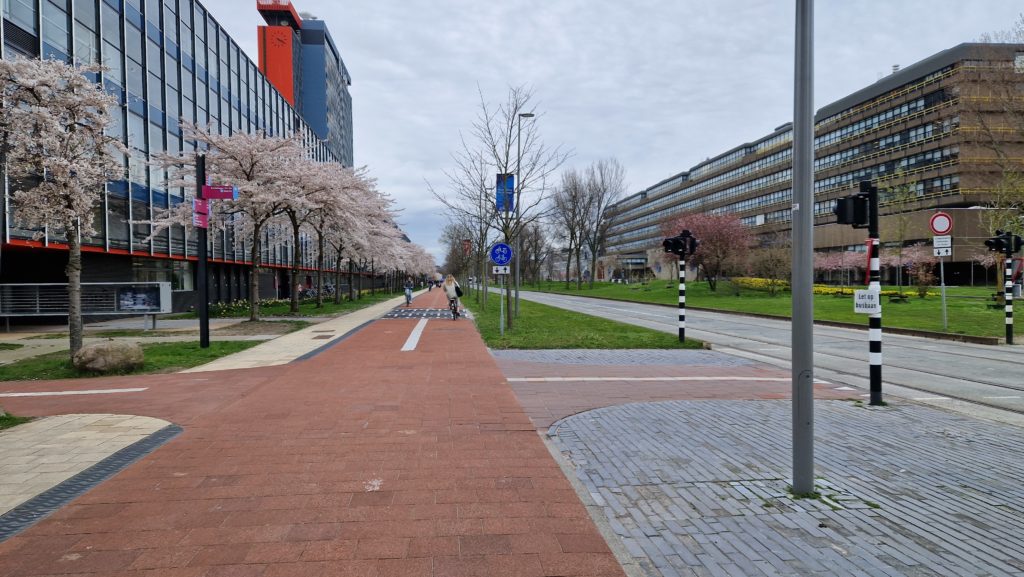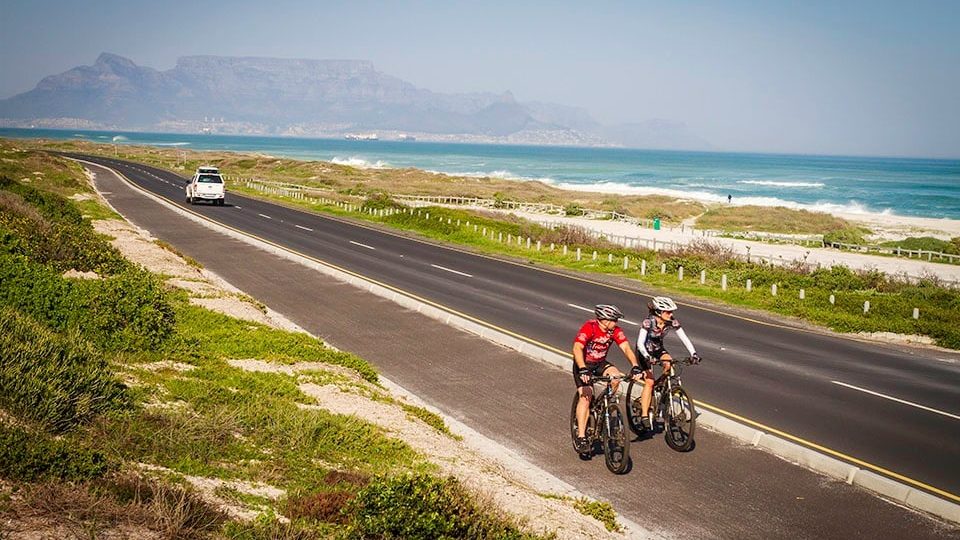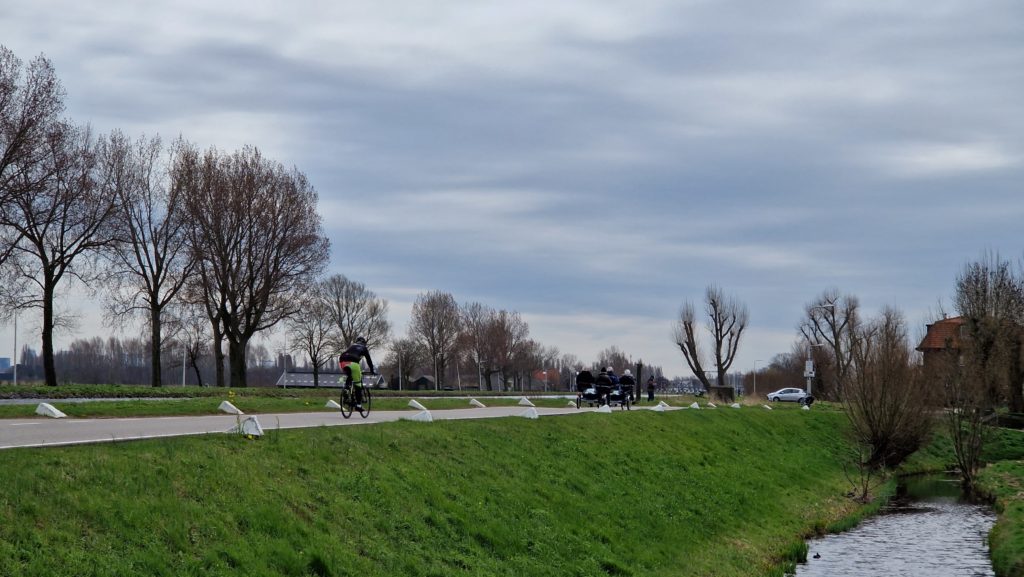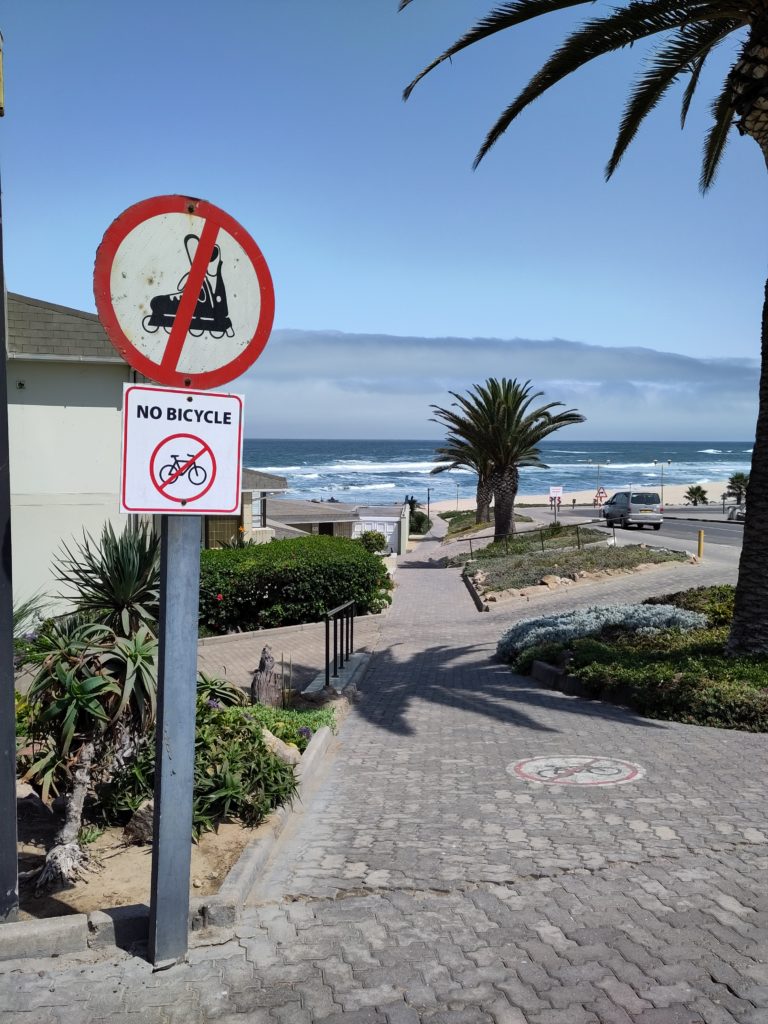Ruben van de Boel (TU Delft), Robin Breedeveld (University of Cape Town), Lejla Adami (University of Birmingham), Hajar El Bakkari (University Mohammed V of Rabat), Sandra Tikale (University of Cologne)

Download the pdf version of the blog
Who can enjoy the benefits of riding a bike, depends on the given infrastructure and the ability and desire to use it for cycling. Also, in the case of existing bike lanes, the way they are shared by different groups of bikers matters. Who can access appropriate infrastructure? Who has the money, time and ‘cultural’ background to enjoy riding the bike? Cycling has a strong potential for well-being. However, infrastructure must be transformed and shared equally.
A curious incident of leisure cyclists
The African anthropologist who sets out to explore the ‘The Pristine and Enigmatic Austria’ in the witty film ‘The Feast of the Chicken’ makes an interesting observation. Although the ‘upper Austrian tribes’ gave up their nomadic lifestyle a thousand years ago, many people are on the move. On the highways and rivers – and on streets flooded with cyclists. Those people cycle, the narrator reveals, not in order to reach a certain location. Indeed, without any further goal in mind, they simply move for the sake of mobility.
What appears rather absurd and explanation-worthy to the anthropological narrator, is in fact, a very particular practice. Whereas leisure cycling in Western European countries is widely practised and appraised for its many benefits, in other places riding a bike is not fun at all. This blog looks at the (un-)well-being effects of cycling, both for leisure and transportation – and the sharing of spaces it depends on.
Biking benefits
Riding a bike has considerable health benefits. According to Wim Bot, lobbyist of the Dutch Cycling Association, regular cycling on average increases a healthy life by 8 months. It decreases overweight, risk of heart disease and helps revalidation. Cycling in a nice environment also boosts mental health considerably. This flexible, convenient, and healthy mode of transport depends on the suitable infrastructure where it is practised. The ideal biking route, Wim Bot explains, is “a route on which you can get from A to B in an easy, comfortable and fast manner. And if possible, with nice scenery as well.”
Health risks for cyclists in Morocco and North Macedonia
One of the biggest challenges to cycling in Morocco is the lack of infrastructure. Roads are not properly paved, and cycling paths are rare due to space prioritisation. This absence of cycling infrastructure affects not only the ability of people to cycle, but also has an impact on their well-being and safety. A research participant confirmed that a cycling journey (going to and coming back from work) makes him suffer physically and psychologically and that he doesn’t feel safe while cycling.
Poorly maintained roads can be dangerous for cyclists, and the absence of dedicated cycling paths means that cyclists are forced to compete with motorised vehicles for space on the roads. Car drivers often disrespect cyclists. In addition, cyclists also suffer from daily headaches as they bike between cars and other big engines, which are even more dangerous. The lack of appropriate infrastructure also contributes to a lack of cycling culture in Morocco.
Air pollution and the unsafety of roads are constraints to the well-being of cyclists in North Macedonia, as they are in Morocco. The narrow streets are busy with cars, and there isn’t enough space for bike lanes. This is why the municipality had to disregard the ones that were put there just recently. Because of the congested roads, cyclists are forced to share the road with vehicles, inhaling the emissions coming directly from the vehicle exhaust, which has significant negative impacts on health and can lead to respiratory illnesses.
The main means of transportation in the city are motor vehicles, which are one of the largest emitters contributing to air pollution. Cycling can significantly decarbonize the transportation sector if more people use it. Therefore, it is important for cities like Tetovo to invest in better cycling infrastructure and encourage people to switch from cars to bikes to achieve a more sustainable future.

Wealthy leisure cycling in Southern Africa
In two Southern African examples, leisure and daily cycling does take place – but who has the capital and intention to do so highly depends on privileges.
In the city of Cape Town cycling is rather a rich people’s hobby than a means to get from A to B. Only the affluent and primarily white neighbourhoods have the privilege of developed cycling infrastructure. When interviewing people living in these neighbourhoods about the reasons why they cycle, they mainly stressed it was for leisure, health benefits and enjoyment. Distances to work are too far to cover on the bicycle, and sometimes the roads are too dangerous and ridden with crime.
In Swakopmund, a town in the coastal desert of Namibia, bicycles are both used during free time and to replace the car. The German colonial past and German-dominated tourism influence cycling practices. Germans that emigrate to Swakopmund often bring their bikes and biking habits with them, enjoying both convenience and health benefits. A young woman with German roots, who was born and raised in Swakopmund, takes her expensive, recently purchased bike to go to work and to exercise in the desert. Both are social events and allow her to appreciate the landscape around her. For tourists, bicycle tours are promoted to facilitate a unique and more environmentally friendly way to experience the sensitive desert environment. There is a decent number of bike lanes in the city and along the beach. As roads are considered unsafe, pavements are used where no bike lanes exist. This sometimes leads to conflicts with pedestrians.

MAMOB’s in the Netherlands
In the Netherlands, a frequent group of leisure cyclists are the MAMOB’s: Middle Aged Men On Bikes. They want to pierce through whatever might be in their way. They often have a racing bike and go on group trips on Sunday mornings. Some of them are against separated bike lanes as they believe they have the right to use the road. However, this will not encourage families and children to cycle on the same roads. Separated bike lanes are much safer. This example shows how even the good cycling infrastructure in the Netherlands is partially contested, and its success depends on how it is used and shared.

Sharing spaces, dividing well-being
Who can enjoy the physical and mental health benefits of riding a bike, depends on the given infrastructure and the ability and desire to use it for cycling. In North Macedonia and Morocco, some people do cycle but the lack of proper bike lanes forces cyclists to share roads with motor vehicles. Instead of increasing well-being, this can pose serious health threats. Also, in the case of existing bike lanes, the way they are shared by different groups of bikers matters.
When MAMOB’s in the Netherlands use bike lanes for an adrenaline rush, this can increase their personal well-being but might also increase the unsafety of companion cyclists. In the two Southern African examples, leisure cycling exists under highly unequal conditions. Who can access appropriate infrastructure? Who has the money, time and ‘cultural’ background to enjoy riding the bike?

Cycling has a strong potential for well-being, perhaps contributing to a cyclotopia one day. However, unless the infrastructure is transformed and shared equally, the seemingly bizarre biking for fun in some places will remain exclusive fun in others.
About the authors
Ruben van de Boel – Hi, I’m Ruben! I recently completed my Bachelor of Architecture at the TU Delft in the Netherlands. My main interests in the field are management and sustainability. I am an advocate for inclusive and collaborative design. I think there is a lot of value in exploring the world and experiencing and developing different visions and contexts!
Robin Breedeveld – Hi! I am Robin, and I am a Master of Development Studies student at the University of Cape Town (UCT) in South Africa. I am currently in my final year, busy writing my thesis on how the militarisation of nature conservation in the Cape Flats affects local communities living next to the nature reserves. I did a BA in International Studies at Leiden University in the Netherlands, with a focus on the African continent. I enjoy doing research, I love academic consultancy and I like to tutor/teach on the side. I am primarily interested in political economy, political ecology, sociology, and the decolonization of knowledge, specifically in Eastern- and Southern Africa.
Lejla Ademi – I am Lejla Ademi from North Macedonia! I am currently pursuing my master’s degree in Air Pollution, Management and Control at the University of Birmingham! Before embarking on this journey, I studied Business and Economics and worked as a finance associate for five years! However, living in Tetovo, which is one of the most polluted cities in Europe, motivated me to switch my career path! Apart from my academic pursuits, I have a keen interest in reading and traveling! Exploring new places and gaining knowledge through books are some of the things that keep me going!
Hajar El Bakkari – I’m Hajar El Bakkari from Salé Morocco. I studied physical sciences in the high school then a bachelor’s and a master’s degree in social and cultural anthropology at the National Institute of Archaeology and Heritage in Rabat. I worked in different fields during my educative years of high studies such as prehistoric and antique archaeological excavations, cultural and social research and fieldwork in different regions of Morocco. I am interested in culture, heritage, arts, environment… Before getting my actual job as a deputy curator in the Museum “La Kasbah for Mediterranean Cultures in Tangier”, I had many experiences and I’ve participated in different projects linked to the disciplines just mentioned. I love travelling, reading and music.
Sandra Tikale – Hi! My name is Sandra and I study Social and Cultural Anthropology at the University of Cologne, Germany. In my studies I focus on Environmental Anthropology, in particular sustainable agriculture. I love to learn about different perspectives and realities, both through actual encounters and reading and writing. From the people I have the pleasure to work together with, I have inherited a passion for compost, earthworms and transformations that heal more than they destroy.

Join the discussion
0 people are already talking about this, why not let us know what you think?